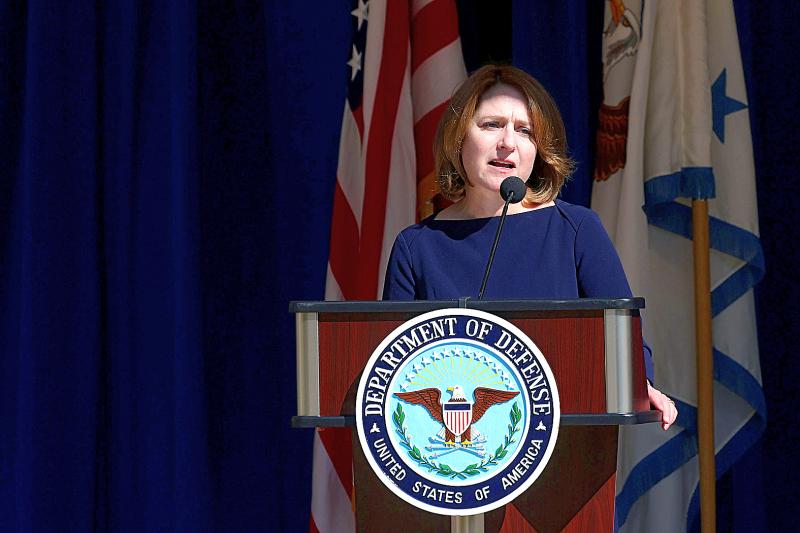The US is capable of “tamping down” China in the event of an invasion of Taiwan, US Deputy Secretary of Defense Kathleen Hicks said on Friday.
The US remains committed to boosting Taiwan’s defensive capabilities, she told an online forum hosted by the Center for Strategic and International Studies.
Asked about what the US would do should China attack Taiwan, Hicks said that Washington is watching the situation in the region carefully “day to day.”

Photo: AFP
“We have a significant amount of capability forward in the region to tamp down any such potential,” Hicks said. “We have good relations, of course, with Taiwan. We have commitments to Taiwan that are enduring since the 1970s.”
The US’ main focus is helping Taiwan increase its capabilities to defend itself in the event of a Chinese invasion, she said.
“The Taiwanese, their ability to defend themselves effectively, is a game-changer in terms of that deterrent calculus for China,” Hicks said.
The US is working closely with its allies and partners, including Taiwan, which has an advanced democratic system and a strong semiconductor manufacturing sector, she said.
“That’s an area we want to have a lot of focus on, as well as our own — and, as I said before, with allies and partners — our own credible demonstration of interests in, frankly, a democracy with an advanced ... semiconductor industry,” Hicks said.
“We have an interest in ensuring democracies can flourish,” she added.
Taiwan Semiconductor Manufacturing Co (TSMC, 台積電) founder Morris Chang (張忠謀) said that the world’s largest contract chipmaker has significant geopolitical value.
TSMC has participated in several semiconductor summits at the White House during a prolonged semiconductor shortage affecting the global auto industry, he said.

MAKING WAVES: China’s maritime militia could become a nontraditional threat in war, clogging up shipping lanes to prevent US or Japanese intervention, a report said About 1,900 Chinese ships flying flags of convenience and fishing vessels that participated in China’s military exercises around Taiwan last month and in January last year have been listed for monitoring, Coast Guard Administration (CGA) Deputy Director-General Hsieh Ching-chin (謝慶欽) said yesterday. Following amendments to the Commercial Port Act (商港法) and the Law of Ships (船舶法) last month, the CGA can designate possible berthing areas or deny ports of call for vessels suspected of loitering around areas where undersea cables can be accessed, Oceans Affairs Council Minister Kuan Bi-ling (管碧玲) said. The list of suspected ships, originally 300, had risen to about

DAREDEVIL: Honnold said it had always been a dream of his to climb Taipei 101, while a Netflix producer said the skyscraper was ‘a real icon of this country’ US climber Alex Honnold yesterday took on Taiwan’s tallest building, becoming the first person to scale Taipei 101 without a rope, harness or safety net. Hundreds of spectators gathered at the base of the 101-story skyscraper to watch Honnold, 40, embark on his daredevil feat, which was also broadcast live on Netflix. Dressed in a red T-shirt and yellow custom-made climbing shoes, Honnold swiftly moved up the southeast face of the glass and steel building. At one point, he stepped onto a platform midway up to wave down at fans and onlookers who were taking photos. People watching from inside

Japan’s strategic alliance with the US would collapse if Tokyo were to turn away from a conflict in Taiwan, Japanese Prime Minister Sanae Takaichi said yesterday, but distanced herself from previous comments that suggested a possible military response in such an event. Takaichi expressed her latest views on a nationally broadcast TV program late on Monday, where an opposition party leader criticized her for igniting tensions with China with the earlier remarks. Ties between Japan and China have sunk to the worst level in years after Takaichi said in November that a hypothetical Chinese attack on Taiwan could bring about a Japanese

STREAMLINED: The dedicated funding would allow the US to transfer equipment to Taiwan when needed and order upgraded replacements for stockpiles, a source said The US House of Representatives on Thursday passed a defense appropriations bill totaling US$838.7 billion, of which US$1 billion is to be allocated to reinforcing security cooperation with Taiwan and US$150 million to replace defense articles provided to the nation. These are part of the Consolidated Appropriation Act, which the US House yesterday passed with 341 votes in favor and 88 against. The act must be passed by the US Senate before Friday next week to avoid another government shutdown. The US House Committee on Appropriations on Monday unveiled the act, saying that it allocates US$1 billion for the Taiwan Security Cooperation Initiative